

Alan Sokal's writings on science, philosophy and culture. "Transgressing the Boundaries: Towards a Transformative Hermeneutics of Quantum Gravity" This is the original "parody" article, published in Social Text #46/47, pp. 217-252 (spring/summer 1996).

Available in four formats: HTML (one large file, 142 KB: easiest to download and print) HTML (many smaller files: perhaps easier to browse) Postscript (365 KB, 39 pages) PDF (436 KB, 39 pages) Also available in Croatian An annotated version of this article -- explaining some of the jokes and providing much additional bibliography -- appears as Chapter 1 of my book Beyond the Hoax. "A Physicist Experiments with Cultural Studies" This is the article in which I reveal the parody, published in Lingua Franca, May/June 1996, pp. 62-64. Also available in Croatian. Sokal's Hoax. The New York Review of Books, Volume XLIII, No. 13, pp 11-15, August 8, 1996 Like many other scientists, I was amused by news of the prank played by the NYU mathematical physicist Alan Sokal.
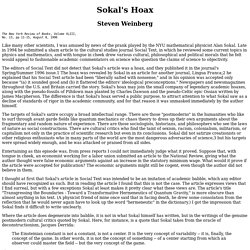
Late in 1994 he submitted a sham article to the cultural studies journal Social Text, in which he reviewed some current topics in physics and mathematics, and with tongue in cheek drew various cultural, philosophical and political morals that he felt would appeal to fashionable academic commentators on science who question the claims of science to objectivity. Frontiers Media. Swiss academic publisher of open access journals Frontiers journals have a controversial reputation.
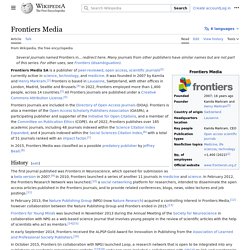
In 2015, Frontiers Media was included in Jeffrey Beall's list of potential predatory open access publishers[6] and has been accused of using email spam.[7] Retraction Watch refers to the publisher as one with "a history of badly handled and controversial retractions and publishing decisions".[8] Nevertheless, both COPE and OASPA have retained Frontiers as a member after concerns were raised.[9][10] It is also part of the Initiative for Open Citations.[11] History[edit] The first journal published was Frontiers in Neuroscience, which opened for submission as a beta version in 2007.[12] In 2010, Frontiers launched a series of another eleven journals in medicine and science.
In February 2013, the Nature Publishing Group (NPG) (now Nature Research) acquired a controlling interest in Frontiers Media.[15] Is Frontiers a potential predatory publisher? The Lausanne-based publishing house Frontiers, founded by the neuroscientists Henry and Kamila Markram, has been recently added to the Beall’s List of potential, possible, or probable predatory scholarly open-access publishers.
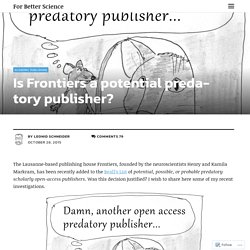
Was this decision justified? I wish to share here some of my recent investigations. Previously, I reported about an editorial conflict at the Frontiers medical section in Laborjournal and Lab Times. In May 2015 Frontiers sacked almost all of its medical chief editors. [D] Dr. Shiva Ayyadurai's post-election analysis of voter fraud in Michigan counties... what's right and what's wrong? : statistics. Using Pokémon to detect scientific misinformation. Opinion: Using Pokémon to Detect Scientific Misinformation. They appear legitimate, but practice no peer review, no editing, not even a reality check.
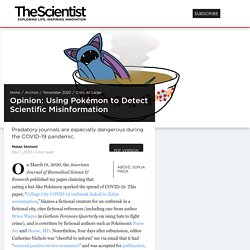
It’s not the only fake paper on Pokémon I’ve had published or accepted for publication, covering creatures from Pikachu to Porygon. Some would argue that editors cannot recognize Pokémon names, but lines in the text such as “a journal publishing this paper does not practice peer review and must therefore be predatory” or “this invited article is in a predatory journal that likely does not practice peer review” would have tipped off anyone who bothered to read the articles. These papers did not slip in under the radar; they were welcomed in blindly. The journals that accepted my papers are predatory. They appear legitimate, but practice no peer review, no editing, not even a reality check.
To make matters worse, my Pokémon-inspired paper on the novel coronavirus has already been cited. Pokemon Go Program Clears Shelter of Dogs Awaiting Adoption. On 17 July 2016 Facebook user Shawn Montgomery published the above-reproduced item, reporting that an animal shelter’s plan to “rent” walkable dogs to embarrassed adult Pokemon Go players proved so popular that all dogs in the facility were adopted in just days: Montgomery’s post asserted that the shelter initially planned to “rent” dogs for $5 per hour to players so they would have an “excuse” to play Pokemon Go, but they soon had a “waiting list” of people looking to walk dogs.
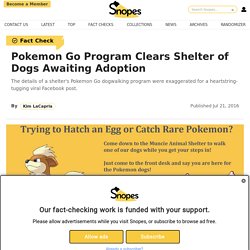
Not long after that the shelter made so much money off the program that they waived all adoption fees as people seeking to adopt specific dogs they had spotted online flooded the shelter, and the waiting list for canines grew even longer because every single dog wound going to a good home. A few elements of the heartwarming story seemed somewhat implausible. ...that’s actually incredible : tumblr. Polarizing Tweets by Russian Trolls on Vaccination Targeted Groups in 2016. During the 2016 election cycle, politically polarizing tweets by Russian trolls about vaccination included pro- and anti-vaccination messages targeted at people with specific political inclinations by trolls using an assortment of fake persona types, according to a new study published this month.
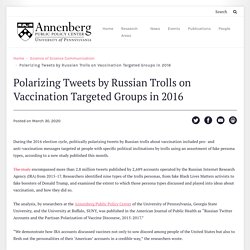
The study encompassed more than 2.8 million tweets published by 2,689 accounts operated by the Russian Internet Research Agency (IRA) from 2015-17. Researchers identified nine types of the trolls personas, from fake Black Lives Matters activists to fake boosters of Donald Trump, and examined the extent to which those persona types discussed and played into ideas about vaccination, and how they did so.
“We demonstrate how IRA accounts discussed vaccines not only to sow discord among people of the United States but also to flesh out the personalities of their ‘American’ accounts in a credible way,” the researchers wrote. Shadow Government Statistics - Home Page. Spider biologist denies suspicions of widespread data fraud in his animal personality research.
It’s been a bad couple of weeks for behavioral ecologist Jonathan Pruitt—the holder of one of the prestigious Canada 150 Research Chairs—and it may get a lot worse.
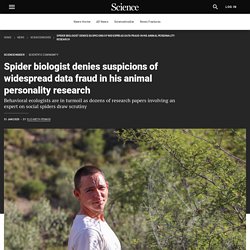
What began with questions about data in one of Pruitt’s papers has flared into a social media–fueled scandal in the small field of animal personality research, with dozens of papers on spiders and other invertebrates being scrutinized by scores of students, postdocs, and other co-authors for problematic data. Already, two papers co-authored by Pruitt, now at McMaster University, have been retracted for data anomalies; Biology Letters is expected to expunge a third within days. Diederik Stapel’s Audacious Academic Fraud. First Draft. How to Spot Fake News : coolguides. Putin’s Long War Against American Science. A rush of tweets turned up the volume.

“Panic here in ATL!!” One stated. Another exclaimed, “OMG! Ebola is everywhere!” As the Kremlin grew more confident, it began to simply recycle old narratives rather than wait for new epidemics to emerge. Six researchers centered at the University of California, Los Angeles, found that, over decades, the false narratives around AIDS had fostered a “lack of trust” among African-Americans that kept many from seeking medical care. Within Russia, Mr. The Economist’s review of Lucas Kello’s new book “The Virtual Weapon and International Order”
Academia is still grappling with the problems that beset computers and networks The Virtual Weapon and International Order.

By Lucas Kello. Yale University Press; 319 pages; £25. Misinformation Has Created a New World Disorder. As someone who studies the impact of misinformation on society, I often wish the young entrepreneurs of Silicon Valley who enabled communication at speed had been forced to run a 9/11 scenario with their technologies before they deployed them commercially. One of the most iconic images from that day shows a large clustering of New Yorkers staring upward. The power of the photograph is that we know the horror they're witnessing. It is easy to imagine that, today, almost everyone in that scene would be holding a smartphone. Some would be filming their observations and posting them to Twitter and Facebook. Powered by social media, rumors and misinformation would be rampant. —— BEALLSLIST.NET —— BEALL'S LIST OF PREDATORY JOURNALS AND PUBLISHERS - Notification. Predatory-journal papers have little scientific impact.
Papers published in ‘predatory’ journals attract little attention from scientists, and get cited much less than those in reputable publications, an analysis shows. Predatory journals are those that charge authors high article-processing fees but don’t provide expected publishing services, such as peer review or other quality checks. Researchers and publishers have long voiced fears that these practices could be harming research by flooding the literature with poor-quality studies. But the authors of the analysis, posted to the preprint server arXiv on 21 December1, say their findings suggest papers in predatory journals have “very limited readership among academics”, and therefore have little effect on science. How Fake Scientific Journals Are Bypassing Detection Filters - Research Stash. The growing network of predatory or fake scientific journals – which publish dubious research for money – is posing new challenges for the research community globally.
The problem of predatory journals. Roughly 12 times a day, Kurt Albertine, PhD, deletes emails from suspicious journals inviting him to submit articles. “Predatory” vs trustworthy journals: What do they mean for the integrity of science? Hundreds of thousands of researchers worldwide have published in so-called predatory journals in recent years. Among them are researchers from renowned research institutes and universities, employees of federal authorities – even a Nobel laureate. Philippe Terheggen, PhD These revelations come from a recent study led by a group of journalists and data experts from more than a dozen leading media outlets across Europe, Asia and the United States and facilitated by the International Consortium of Investigative Journalists (ICIJ).
The group analyzed 175,000 scientific articles published between 2012 and 2018 by five of the world’s largest pseudo-scientific platforms. Their dossier and corresponding database, now in the public domain, have reignited a global debate about the integrity of science. What are "Predatory" Journals? - Selecting Quality Journals and Conferences for Academic Scholarship - LibGuides at Hostos Community College Library. A Scholarly Sting Operation Shines a Light on ‘Predatory’ Journals This is the official memo to CUNY faculty, by Daniel McCloskey, Interim Associate Vice Chancellor, CUNY Office of Research and Gregory Gosselin, Interim University Dean of Libraries and Information Systems.
November 1, 2017. Written after Ms. Beyond Beall’s List: Better understanding predatory publishers. Beyond Beall’s List: Better understanding predatory publishers Monica Berger; Jill Cirasella * Contact series editors Zach Coble, digital scholarship specialist at New York University, and Adrian Ho, director of digital scholarship at the University of Kentucky Libraries, at E-mail: crlnscholcomm [at] gmail.com with article ideas. A Massive Hoax Involving 20 Fake Culture Studies Papers Just Exploded in Academia. Stop me if you've heard this one before: a physicist, a philosopher, and a medievalist got together and decided to hoax cultural studies journals with a score of fake research papers.
The story is familiar, but this time the joke is far bigger. (99+) (PDF) How to identify the fake science journals. (99+) (PDF) Gaming the Metrics: Misconduct and Manipulation in Academic Research. (99+) (PDF) Hijacked Journals and Predatory Publishers: Is There a Need to Re-Think How to Assess the Quality of Academic Research? Why Telling People They Don’t Need Masks Backfired. Sixth, masks are an important signal that it’s not business as usual as well as an act of solidarity. Pandemics require us to change our behavior — our socialization, hygiene, work and more — collectively, and knowing our fellow citizens are on board is important for all efforts. Finally, providing top-down guidance with such obvious contradictions backfires exactly because lack of trust is what fuels hoarding and misinformation.
It used to be said that back in the Soviet Union, if there was a line, you first got in line and then figured out what the line was for — people knew that there were going to be shortages and that the authorities often lied, so they hoarded. And when people feel as though they may not be getting the full truth from the authorities, snake-oil sellers and price gougers have an easier time. Misinformation and Its Correction Continued Influence and Successful Debiasing. On the lookout for ‘predatory journals’ The emails can be flattering. An academic journal with an important-sounding name (Journal of Comprehensive Research, say, or Academy of Social Science Journal) wants to publish your work. Maybe they even want to make you into an “editor.” There are “Nobel Laureates” on the board, the email boasts. Perhaps this august-sounding publication is even inviting you to a conference in Hong Kong, Hyderabad or someplace else you’ve always wanted to visit.
Get informed before you hit reply – there’s a good chance the journal is a fake. Predatory academic journals have become widespread, according to Jeffrey Beall, scholarly communications librarian at the University of Colorado, Denver. Everything You Ever Wanted to Know About Predatory Publishing but. Why Some Scientists Are Inventing Fake Colleagues. Hoss Cartwright, a former editor of the International Journal of Agricultural Innovations and Research, had a good excuse for missing the 5th World Congress on Virology last year: He doesn’t exist. Burkhard Morgenstern, a professor of bioinformatics at the University of Göttingen, dreamt him up, and built a nice little scientific career for him. He wrote Cartwright a Curriculum Vitae, describing his doctorate in Studies of Dunnowhat, his rigorous postdoctoral work at Some Shitty Place in the Middle of Nowhere, and his experience as Senior Cattle Manager at the Ponderosa Institute for Bovine Research.
Cartwright never published a single research paper, but he was appointed to the editorial boards of five journals. The scourge of uromycitisis and fake journals - Citrome - 2017 - International Journal of Clinical Practice. The Price for ‘Predatory’ Publishing? $50 Million. News & Editorials. When trust is diminished, the scientific enterprise itself is threatened. The International Committee of Medical Journal Editors (ICMJE) is concerned by the growing number of entities that are advertising themselves as “scholarly medical journals” yet do not function as such.
Fake academic journals are publishing work from real researchers alongside junk science - Poynter. 400,000 Scientists All Over the World Have Been Published in Fake Journals. View of large amount of documents, newspapers, and books in classic library. A magnifying glass seen on top of books. A self-experiment in fake science: the tricks of predatory journals. By Athanasios Mazarakis, Kaltrina Nuredini and Isabella Peters In the summer, a piece called „Fake Science – Die Lügenmacher“ (“The Lie Creators”) aired on ARD, and it left a lasting impression on the scientific community.
What the New Sokal Hoax Reveals About Academia. Pseudoscience is taking over social media and putting us all at risk. The Influencer Scientists Debunking Online Misinformation. Evidence-based strategies to combat scientific misinformation. Fighting Science Misinformation. Scientific misinformation. Be Data Literate - Fake News, Propaganda, and Misinformation: Learning to Critically Evaluate Media Sources. - LibGuides at Cornell University.
Detect coronavirus misinformation in 30 seconds. Tumblr rolling out an internet literacy initiative to help combat misinformation. Misinformation vs. media studies: on teaching to fish. Fake News: How To Spot Misinformation : NPR. Media Literacy in an Age of Fake News. Misinformation & News Literacy - Free Resources - LibGuides at Florida Atlantic University. Day 5: Recognizing misinformation — News Literacy Project. How Scammers Are Spreading Horrifying Coronavirus Disinformation To Millions. Bogus Journal Accepts Profanity-Laced Anti-Spam Paper - scholarlyoa.com. Get Me Off Your Fucking Mailing List (2005) [pdf]